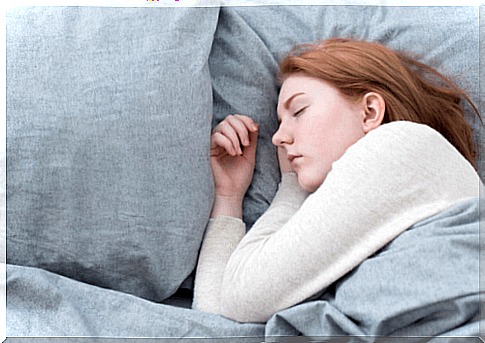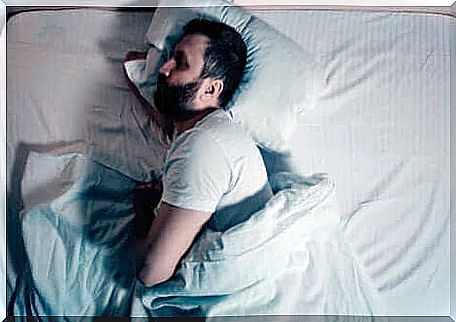How Does Sleep Affect Our Body?

We all know that sleep is fundamental to the mind and body. But do you know what happens when you close your eyes? Why is it important to get a good night’s sleep and how can you achieve a sound sleep? In today’s article, we address these questions.
What happens when you sleep
Of course, we have long known the importance of sleep, but recent research with modern technology has made it possible to find scientific explanations for various phenomena that take place during the night.

The brain, specifically the pineal gland, prepares the body for sleep by signaling tiredness by releasing melatonin.
The pineal gland, which is located in the midbrain, is a small, cone-shaped organ. It is not only responsible for the release of melatonin, but also for the well-known “happiness hormone” serotonin, which is involved in regulating the internal clock and intuition, among other things. The pineal gland also plays a role in the physical and psychological aging process, as it can repair cell damage through its antioxidant potential.
With increasing exhaustion, the pineal gland turns the hormone serotonin, which it releases during the day, into the sleep hormone melatonin. It releases this endogenous messenger substance into the bloodstream and into the cerebrospinal fluid and thus makes the body sleepy.
The body temperature is barely noticeably reduced, the blood pressure drops and the breath and heartbeat slow down. If you stay in dark, quiet and cool rooms and bring your body into a comfortable resting position, you will probably fall asleep within a very short time. This normally takes no more than five to thirty minutes. The transition from wakefulness to sleep occurs at lightning speed through the release of chemical substances in our brain that override our consciousness.
The phases of sleep
Sleep takes place in phases of around ninety minutes. It begins with the deep sleep phase, in which all functions of the body rest, and then alternates with the dream phases, in which the brain is very active. This phase is also called the REM phase (Rapid Eye Movement) due to the rapid eye movements.
During the REM phase, the brain processes impressions and experiences and prepares itself for the next day. In the case of extremely bizarre dreams, researchers assume that these parts of the brain train that are otherwise under-challenged.
While the body recovers and our mind processes various experiences, the immune system is also active and strengthens us.

Why is getting enough sleep so important?
Sleep enables you to recover, heal and have a stable psyche. But it’s about more than just wellbeing.
Getting enough sleep is particularly important for growing children in order to stay healthy and develop properly. Depending on your age, you need up to 17 hours a day, but these are interrupted again and again.
But sleep is also essential for adults. During the rest period, memories are formed and processed. Melatonin and the activation of the immune system also enable cell repair and this is important in order to stay young as long as possible.
A full sleep cycle takes about an hour and a half. Of this, the body needs about 50 minutes for falling asleep or light sleep. The sequence of sleep phases is repeated several times, which is why it is essential to sleep for several hours continuously in order to actually be able to recover. However, very brief waking moments that last no more than a minute or two are normal. You are usually not even aware of this. The quality of sleep does not suffer as long as there are no significant disturbances.
Too little sleep not only has a negative effect on the energy balance and mood, but also affects concentration, reaction time, cognition and mental and mental health. Anyone who suffers from lack of sleep or difficulty sleeping through the long term has a higher risk of diabetes, high blood pressure, heart disease and stroke.
In most cases, sleep problems can be regulated by changing habits. However, there are also diseases that affect the circadian rhythm or cause sleep disorders for other reasons.
These so-called sleep-wake rhythm disorders can only rarely be brought under control without medication. That is why it is important to consult a neurologist or sleep expert in this case. Sleep apnea (cessation of breathing during sleep), chronic insomnia or sleep-related movement disorders also require medical treatment.
What does healthy sleep look like?
A healthy, adult person without sleep disorders sleeps an average of 7 to 9 hours. However, the need for sleep varies from person to person, some are rested with fewer hours, others need more. There are also short sleepers for whom five hours are enough, but these are exceptional cases. A regular sleep rhythm is particularly important. It is also advisable to keep this on weekends.
Stress has a profound effect on our sleep. It is therefore advisable to avoid stress as much as possible. Since this is often difficult, you should learn to manage stress properly to keep the consequences as low as possible.
A healthy night’s sleep depends not only on the length and depth of sleep, but also on the environment. The following tips can help you prepare everything for your sleep:
- Use a good quality, comfortable mattress on a sturdy slatted frame.
- Try to sleep in a position that doesn’t put too much strain on your spine.
- The room should be cool (not cold) and clean to guarantee a good quality of sleep.
- Background noise could interfere with your sleep, so avoid it if possible.
- Avoid exercise, caffeine, and heavy meals in the evening.
- Try to be outdoors as much as possible during the day.
- You should get electronic devices out of your bedroom. Avoid using a TV, laptop, tablet, or smartphone for at least an hour before bed.
- Try to reduce stress in everyday life as much as possible.
- Before going to sleep, relax by reading a book, for example.
- You can also keep a journal to help you get rid of any worries that may disturb your night’s sleep.
- Develop regular habits and healthy sleeping habits. Relaxation techniques are also very helpful!









